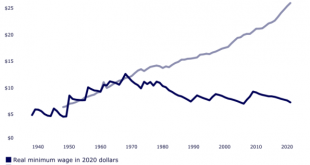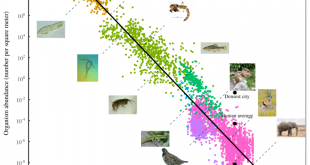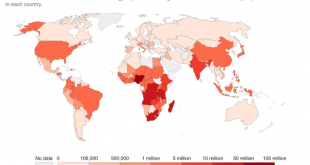from Lars Syll The Coin-tossing Problem My friend Ben says that on the first day he got the following sequence of Heads and Tails when tossing a coin: H H H H H H H H H H And on the second day he says that he got the following sequence: H T T H H T T H T H Which report makes you suspicious? Most people yours truly asks this question says the first report looks suspicious. But actually both reports are equally probable! Every time you toss a (fair) coin there is the same probability (50 %)...
Read More »Capitalism and workers’ power
from David Ricardo You don’t have to read Marx to understand the lack of power workers have under capitalism. But you do have to read beyond mainstream economists and economic pundits. You might turn, for example, to the business school. Yes, I know, that’s a strange assertion. But let me explain. The usual argument these days is that workers have acquired a lot more power because of the scarcity of labor. When labor is scarce (basically, when the quantity supplied of labor is less than...
Read More »Weekend read – Who’s in charge: us or our technology?
from Peter Radford So who is in charge? Who controls the flow of technology? Is it us? Or does the technology now control us? We live in a technology infused world. Our current civilization sits on a foundation accumulated through the past few centuries and built of machine power. We cannot separate ourselves from this cumulative support system without regressing to a pre-industrial way of life. Which is something few of us either want or are equipped to deal with. We have...
Read More »Keynes was not a Keynesian. He was a Post Keynesian!
from Lars Syll But these more recent writers like their predecessors were still dealing with a system in which the amount of the factors employed was given and the other relevant facts were known more or less for certain. This does not mean that they were dealing with a system in which change was ruled out, or even one in which the disappointment of expectation was ruled out. But at any given time facts and expectations were assumed to be given in a definite and calculable form; and...
Read More »The $26 an Hour Minimum Wage
from Dean Baker That may sound pretty crazy, but that’s roughly what the minimum wage in the United States would be today if it had kept pace with productivity growth since its value peaked in 1968. And, having the minimum wage track productivity growth is not a crazy idea. The national minimum wage did in fact keep pace with productivity growth for the first 30 years after a national minimum wage first came into existence in 1938. Furthermore, a minimum wage that grew in step with the...
Read More »Sapere aude!
from Lars Syll Enlightenment is man’s emergence from his self-imposed nonage. Nonage is the inability to use one’s own understanding without another’s guidance. This nonage is self-imposed if its cause lies not in lack of understanding but in indecision and lack of courage to use one’s own mind without another’s guidance. Sapere aude! “Have the courage to use your own understanding,” is therefore the motto of the enlightenment. Laziness and cowardice are the reasons why such a large part...
Read More »Weekend read – The evolution of ‘big’: How sociality made life larger
from Blair Fix The game I play is a very interesting one. It’s imagination in a tight straitjacket. — Richard Feynman Like Richard Feynman’s game of science, evolution is stuck in a straitjacket. It is driven by chance. But evolution is not free to explore every path. Take, as an example, the evolution of organism size. While it seems like there are many routes to bigness, I propose that there is fundamentally only one: sociality. In the march towards ever-larger organisms, there have...
Read More »Food poverty map
Behavioural economics and complexity economics
from Lars Syll What is to take the place of neoclassical economics and its neoliberal policy offshoot? There is no shortage of candidates, grouped under the broad banner of economic heterodoxy. Some of these successor doctrines – behavioral economics and complexity economics are examples of note – take the neoclassical orthodoxies as a point of departure. They therefore continue to define themselves in relation to those orthodoxies. Others avoided the gravitational pull altogether – or,...
Read More »Diversity in economics
from Peter Radford In this case geographical diversity. Dani Rodrik has brought to our attention a rather serious problem within the economics profession: it is still dominated by people living and working in the West. As a consequence it has a decided bias towards issues that are of significant interest to the West. This is, of course, not news to any of you not living in the West. Nor is it news to anyone outside the profession paying attention to the product of the journals and...
Read More » Real-World Economics Review
Real-World Economics Review








